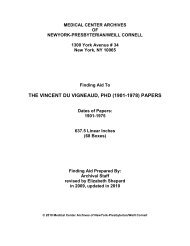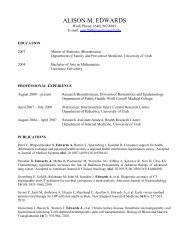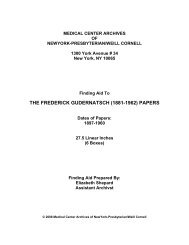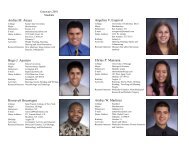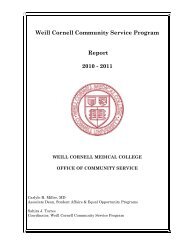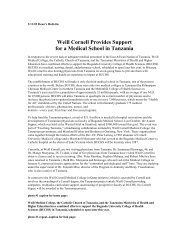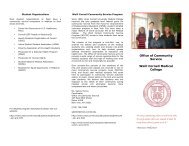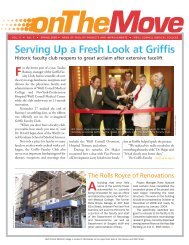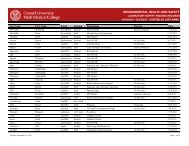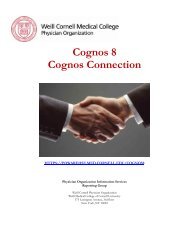Weillcornellmedicine - Weill Medical College - Cornell University
Weillcornellmedicine - Weill Medical College - Cornell University
Weillcornellmedicine - Weill Medical College - Cornell University
Create successful ePaper yourself
Turn your PDF publications into a flip-book with our unique Google optimized e-Paper software.
But that gratification has a flip side: ask Engelland about her greatest source of job frustration, and it’s<br />
how such contributions are undervalued by the medical insurance system. “I feel like I make a difference<br />
every day—but you don’t get compensated for making a difference. You do if you fix someone’s broken<br />
bone, but you don’t get reimbursed for having a conversation that could make a difference in a kid’s life.”<br />
Such realities can make it hard to draw young doctors to the field. Although Chang says she and Ipp love<br />
to share their passion for adolescent medicine with medical students, she notes that doing a three-year fellowship<br />
on top of a residency—without the financial incentives that other subspecialties offer—can be a<br />
tough sell. “It’s rewarding, but it’s not necessarily the most popular field,” Chang says, “I see this group as<br />
a population in need. They’re not little kids, but they’re certainly not adults yet. They need people who<br />
will answer their questions and be adult role models for them. It’s so rewarding when you make that connection<br />
with a teenager. It’s amazing that if you talk to them in the right way, they’ll open up to you.”<br />
Although many people assume that adolescents can be evasive or dishonest with their doctors, the<br />
physicians say that’s rarely the case. “I’ve found time and time again that adolescents are a more forthright<br />
group than they are thought to be,” Ipp says. “If they’re asked the history questions in a fashion where<br />
they feel safe, they actually offer a lot of information about themselves.” One of Engelland’s sidelines is<br />
teaching patient interview techniques to students at Albert Einstein <strong>College</strong> of Medicine. She emphasizes<br />
the importance of making a connection with a patient, forming a solid basis of trust. “What I always say<br />
is that if I lay the groundwork—which includes the minute the patient walks in the front door and sees<br />
that it looks different from the pediatrician’s office, sitting down with the mother and the kid and discussing<br />
the rules of confidentiality,<br />
building a skillful<br />
interview so I get to the more<br />
sensitive stuff later on, or just<br />
listening to them—when you<br />
do all that, I’ve found they<br />
tell the truth. Or, almost<br />
always, I can tell if they’re not<br />
telling the truth. That doesn’t<br />
mean I know what the truth<br />
is. But I can tell if they’re<br />
lying—body language says a<br />
lot. And I can tell if they<br />
aren’t ready to open up about<br />
a particular subject, and you<br />
just have to leave them<br />
alone.”<br />
Engelland did a general<br />
pediatric residency at Columbia<br />
followed by a fellowship<br />
in adolescent medicine<br />
at Montefiore. But on top of<br />
her medical training is vast<br />
front-line experience in raising<br />
adolescents. She has four<br />
biological children—and ten<br />
years ago, she and her husband<br />
became guardians to the<br />
three children of a friend who<br />
had passed away following<br />
his wife’s death from breast<br />
cancer. “So I ended up with<br />
seven kids,” she says. “I had<br />
Lisa Ipp, MD ’96, and Jane Chang, MD<br />
to stop working for four years<br />
to get everybody organized.”<br />
Engelland’s brood now ranges<br />
in age from fifteen to twenty-seven—and she cheerfully admits that her day job makes her a formidable<br />
parent. “Sometimes they say, ‘How do you know that?’ and I say, ‘I just know,’” says Engelland, whose role<br />
as district physician for the Mamaroneck schools makes her even more teen-savvy. “I know where the kids<br />
go to drink and smoke. I have my finger on the pulse of what it means to be a teenager in this community,<br />
so my kids think I have eyes in the back of my head.” •<br />
ABBOTT<br />
WINTER 2008/09 39



